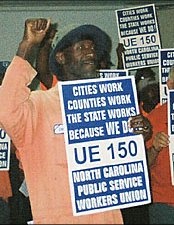A bill of rights for North Carolina workers

By Ajamu Dillahunt, N.C. Justice Center
Laws that protect workers from abusive employers, unsafe conditions, and destitution in times of unemployment or other crises are found in various state and federal statutes. However, there is no coherent set of laws laying out what working people need and are entitled to.
A Workers' Bill of Rights would assure that workers have the structural support to take care of their families, stay healthy and contribute to the development of their communities.
A History of Workers' Rights
In 1944 President Roosevelt proposed an Economic Bill of Rights. With the lessons of the Great Depression in mind, he proffered a set of principles that would guarantee against the individual destitution experienced by so many. It called for, in part, "the right to a useful and remunerative job in the industries or shops or farms or mines of the nation; the right to earn enough to provide adequate food and clothing and recreation; the right to adequate medical care and the opportunity to achieve and enjoy good health."
Jesse Jackson's 1988 presidential campaign proposed a Worker's Bill of Rights, which included a woman's right to pregnancy leave and guarantees of a safe workplace and a living wage. In 1996, the Labor Party, founded by several national unions, labor councils and individual trade unionists, adopted a "Workplace Bill of Rights," which emphasized the right to organize "without interference from the employer and that the right be available to all irrespective of job titles and responsibilities, citizenship status, method of payment or sector of the economy in which employed."
In this century, North Carolina mental health workers represented by the North Carolina Public Service Workers Union have advocated for a Mental Health Workers Bill of Rights. This proposed standard requires protections for workers and patients alike: "the right to a safe workplace, including the right to protect oneself from harm with consideration for the safety of the patients and the right to refuse work that poses a danger to one’s health and safety; the right to adequate and updated equipment and techniques to ensure safer working conditions and quality care for patients."
A Vision for North Carolina Workers
Challenging legislative times for workers and progressives require not only defensive advocacy but also imagination and vision. The Justice Center and our partners are holding "Know Your Rights" workshops across the state, and in partnership with workers we are developing a future North Carolina Workers' Bill of Rights. Playing the role of "labor legislators," workshop participants propose laws that would govern the treatment of workers in the state. Free to brainstorm based on their experiences and needs, workers have made far-ranging recommendations, but some consistent ideas have emerged.
* Equal pay for equal work
* No discrimination in hiring, pay or promotions
* The end to wage theft
* Safe equipment and appropriate training
* Stronger government enforcement of occupational safety and health laws
* Health insurance for everyone
* Health and other benefits for workers’ partners
* Paid sick leave and family medical leave
* A ban of the box asking about felony convictions from applications
* Abolition of “right to work” laws, which discourage union organizing
* Collective bargaining rights for all workers
* A guaranteed living wage tied to inflation
In spite of the difficulty, workers and advocates will continue to push for needed reforms, resisting the stale and disingenuous excuse from anti-worker legislators that this is not a good time to make changes that have fiscal consequences. In fact, this is precisely the time when families and struggling communities most need these changes.
(This story originally appeared in "Policy & Progress," a publication of the N.C. Justice Center, where Dillahunt is the senior outreach coordinator for the Workers' Rights Project. He also serves as co-chair of the board of the nonprofit Institute for Southern Studies, publisher of Facing South. To host a workers' rights workshop, contact ajamu@ncjustice.org. Photo by Ashaki Binta.)
Tags
Ajamu Dillahunt
Ajamu Dillahunt is a Southern labor and social justice activist. He is a retired postal union leader and continues to work as a popular educator. His many organizational affiliations include the Black Workers for Justice, the Labor Network for Sustainability and the board of Fertile Ground Food Cooperative.
